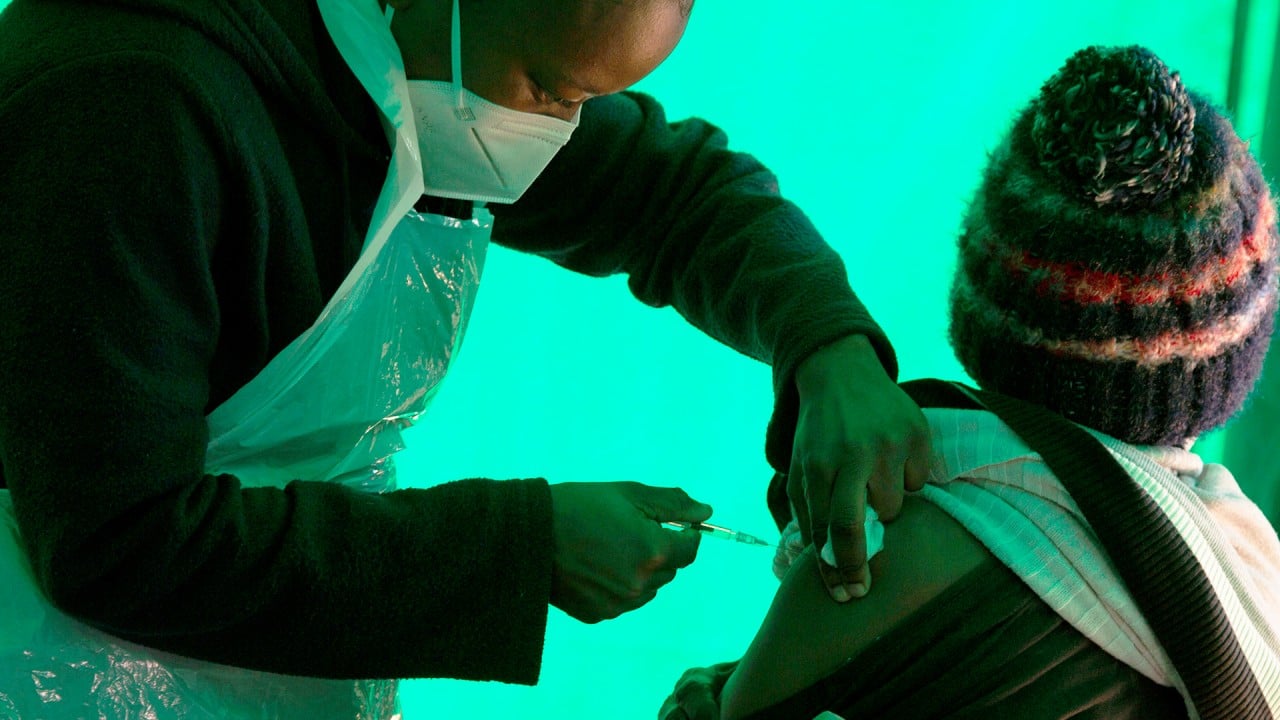
Scientists call on world to help Africa with Covid-19 vaccines in wake of Omicron variant
- South African medical specialists say vaccine equity and reducing the stigma around HIV will help curb future variants
- So far only 7 per cent of Africa’s population has been vaccinated, prompting calls for rich countries to do more to redress the imbalance
In an opinion piece published in the journal Nature on Thursday, four scientists and clinical practitioners working in hospitals and laboratories across South Africa said vaccine equity across the continent and a reduction in the stigma surrounding HIV could help reduce the number of future variants.
“A failure to tackle the pandemic with sufficient urgency in countries with high rates of uncontrolled advanced HIV could lead to the emergence of variants of the coronavirus Sars-CoV-2 that spread more easily between people or render the vaccines less effective,” they warned.
People with weakened immune systems can remain infected with the virus for several weeks or months, compared with the average of around two weeks, increasing the chance of the virus mutating, according to the researchers.
“For people living with HIV, protection from Covid-19 requires a renewed commitment to vaccine equity between countries. This must come from high-income nations and multilateral initiatives such as Covax,” they said, referring to the vaccine distribution platform co-led by the World Health Organization, Gavi the Vaccine Alliance and the Coalition for Epidemic Preparedness Innovations.
South Africa first reported the new variant, now named Omicron, to the WHO on November 24.
On Tuesday, WHO Director General Tedros Adhanom Ghebreyesus said: “The longer we allow the pandemic to drag on – by failing to address vaccine inequity, or to implement public health and social measures in a tailored and consistent way – the more opportunity we give this virus to mutate in ways we cannot predict or prevent.
“We still have more questions than answers about the effect of Omicron on transmission, severity of disease, and the effectiveness of tests, therapeutics and vaccines,” he said, while thanking both Botswana and South Africa for detecting, sequencing and reporting the variant.
In a statement on Monday, the African Union, the Africa Centres for Disease Control and Prevention, and Covax leaders said most vaccine donations to date have been ad hoc, provided with little notice and short shelf lives.
“This has made it extremely challenging for countries to plan vaccination campaigns and increase absorptive capacity,” they said, calling on donors and manufacturers to give at least one month’s notice and deliver doses with at least 10 weeks of shelf life.
Most African countries have not vaccinated their citizens. The WHO said while many high-income countries reported more than 60 per cent vaccine coverage, just over 7 per cent of Africa’s population is fully vaccinated – despite a recent rise in shipments to the continent.
African nations have received 330 million doses as of late November from Covax, the African Vaccine Acquisition Task Team and bilateral agreements since February, with 83 per cent of them delivered since August, according to the WHO Regional Office for Africa.
Sub-Saharan Africa is home to two-thirds of the 37.7 million people living with HIV worldwide, according to UNAIDS. It said the risk of dying from Covid-19 among people with HIV was double that of the general population, citing studies from England and South Africa.
The scientists in South Africa said prioritising older age groups for vaccination was appropriate but it meant “further delays to vaccinating Africa’s main immunocompromised population”, given around 80 per cent of people with HIV across the continent are under 50 years old.
“A 30 to 50 per cent increased chance of death from Covid-19 for a young sector of the population that makes up most of the workforce could have devastating consequences in the long term,” they said.
The researchers also called for government and health agencies to support surveillance and monitoring to evaluate the effectiveness of vaccines in the HIV population and if and when booster shots should be used.
According to the WHO, people with HIV were not included in clinical trials of vaccines developed by Chinese companies Sinopharm and Sinovac, which have been granted emergency use listing.
“But given this is a non-replicating vaccine, persons living with HIV who are a part of the recommended group for vaccination may be vaccinated,” the UN agency said, adding that counselling should be provided to individuals.


